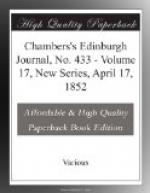the homeliness of the furniture, though everything
was remarkably clean. In another dormitory up
stairs, we found ten or twelve bedrid women, one of
them within a few months of completing the hundredth
year of her age, but able to converse. Another
was a comparatively young woman, who had three months
ago had a limb amputated. A Sister, in her plain
dark dress, stood in this room, ready to attend any
of the poor women. We were next conducted to
a large room, where a number of the inmates were at
dinner. They rose modestly at our entrance, and
we had some difficulty in inducing them to resume
their seats. We were curious to see the viands,
knowing that they were composed solely of the crumbs
from the rich man’s table, and having some idea,
that as most of the Sisters were French, there might
be some skill shewn in putting these morsels into
new and palatable forms. We did not, however,
find that the dishes were superior to what might have
been expected in a workhouse. The principal article
was a pudding, composed of pounded scraps and crusts
of bread, and bearing much the appearance of the oatmeal
porridge of Scotland. Ladies attend the old women
at table, acting entirely as servants do in a gentleman’s
dining-room, though only in the limited extent to
which such services are required at a meal so simple.
It is only after this meal is concluded, that the ladies
sit down to their own equally frugal fare. We
were curious to know if they indulge in tea, considering
this as a sort of crucial test of their self-denying
principles. We were informed that the article
is not bought for them, on account of its being so
expensive. Used tea-leaves are obtained from
the tables of certain families of rank, and are found
to be of service for the comfort of the more infirm
women. After the inmates are served, if any tea
be left, it is taken by the ladies.
We next descended to the kitchen, and there found
a young woman at work as a cook, not a Sister, but
one who may be so ere long, if she passes her novitiate
successfully. The magazine of crusts and lumps
of bread, of broken meat and cold soups, coffee and
tea, which we saw here, was a curious sight.
We were also shewn the pails and baskets in which
the Sisters collect these viands. Two go forth
every morning, and make a round of several hours amongst
houses where they are permitted to apply. Meat
goes into one compartment, bread into another.
A pail of two divisions keeps a variety of things distinct
from each other. Demurely pass the dark pair along
the crowded thoroughfares of the metropolis, objects
of momentary curiosity to many that pass them, but
never pausing for a moment on their charitable mission.
The only approach to a smile on our conductress’s
face, was when she related to us how, on their return
one afternoon, a poor woman who had lost a child,
traced them to the door, and made a disturbance there,
under a belief that the cloak of one of them, instead
of covering a collection of broken meat, concealed
her infant.




